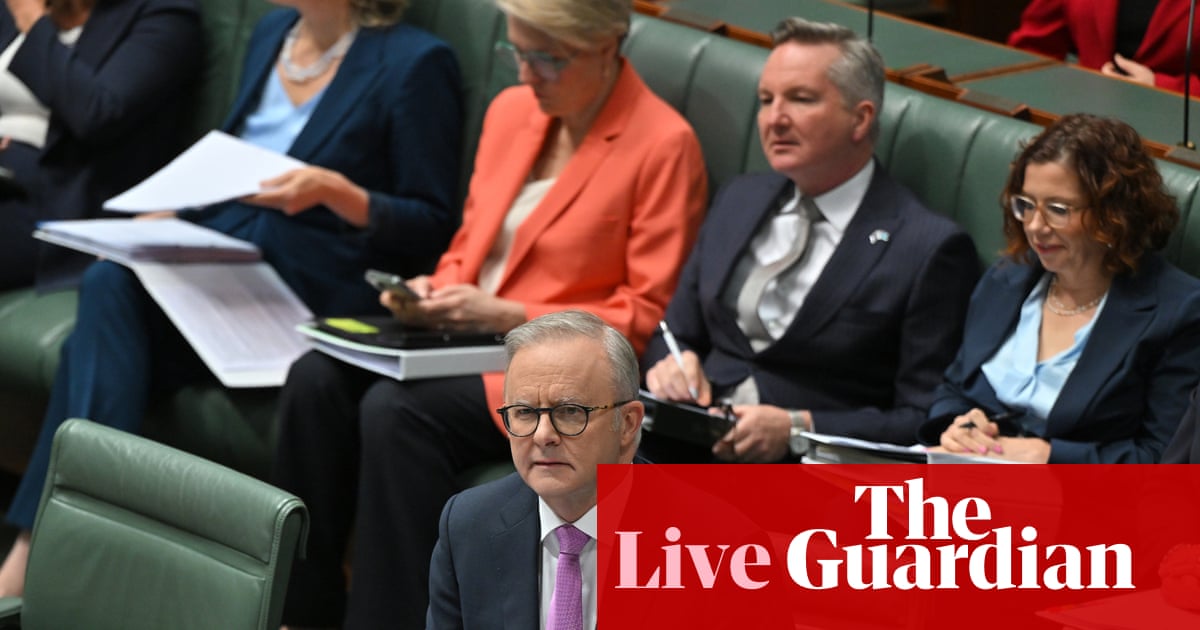
Question time begins
Sussan Ley kicks off question time and asks about tariffs.
Ley says yesterday trade minister Don Farrell seemed to “invent” a conversation between the PM and Donald Trump about beef – so, she asks, how can the government be trusted to lower tariffs from the US if the trade minister “confuses” a public statement by Trump with a private phone call?
Anthony Albanese takes the call, and says that phone call with Donald Trump in May resulted in Trump calling the PM “very good” and “a friend”.
He then rattles off some familiar lines about tariffs being “economic self-harm” for the US and that the government will continue to push for zero tariffs.
Americans are still importing goods from the global community. They’re just paying more for them, which is why I argued that tariffs are an act of economic self-harm and which is why Australia hasn’t reciprocated with tariffs.
Key events
The next question comes from Melissa McIntosh, who asks whether it’s not just your medicare card that you need to see a GP, but your credit card too.
You might remember the PM brought a medicare card to pretty much every single event he had during the election campaign.
Health minister Mark Butler says the government has been turning the falling bulk-billing rates around, and questions why then, the opposition immediately matched the government’s pre-election commitment of $8bn towards bulk-billing.
The manager of opposition business, Alex Hawke, tries to make a point of order, and Milton Dick tells Butler to stay on track and stop talking about opposition policy.
He doesn’t really listen, and says:
What this has done is cleared up whether the support they gave to our policy was some road to Damascus conversion by Peter Dutton and by the now Leader of the Opposition who’d caused this problem in the first place or whether it was a cynical political device. This question clears that up forever.
Chris Bowen gets Coldplay kiss cam into Hansard
In a dixer on the government’s energy policy, Chris Bowen takes the opportunity to get the Coldplay couple into Hansard.
Appointing Senator [Matt] Canavan to review net zero is like putting Coldplay in control of kiss cam. It doesn’t necessarily lead to a happy marriage.
Whether that means the memes about that couple are now dead … I’ll leave that up to you.
David Littleproud queries decision to lift some restrictions on US beef imports
Nationals leader David Littleproud asks the next opposition question to agriculture minister Julie Collins.
The Nationals have called for an independent review into the decision by the agriculture department to lift some restrictions on US beef imports.
Littleproud asks:
[Were] the inspector general of biosecurity’s recommendations that import risk assessments should include the oversight of a scientific advisory panel implemented in the decision to overturn US beef import bans? If not, why not?
Collins says there was a risk based assessment done by the department, and the decision was made “on a scientific basis”.
She also warns the opposition “not to be undermining Australia’s biosecurity”.
The opposition erupts over that, and Milton Dick again tells the opposition benches to “cool it”.
Treasurer takes question on 4.2% unemployment rate
Back to the opposition, shadow treasurer Ted O’Brien asks the treasurer why unemployment has spiked to its highest level in three years.
Jim Chalmers says unemployment is on average lower than under any other government in the last 50 years.
The unemployment rate for June was 4.2%. Chalmers says:
This is precisely why the people in front of the member for Fairfax are more excited about his promotion than the people behind him. Because he bowls up these absolute dollies. He’s doing his best to make the former shadow treasurer look good.
O’Brien’s not happy with Chalmers’ answer, and interjects … 14 times according to Milton Dick, who tells him “cool it”.
Chalmers ends the answer saying that the government has made progress but isn’t pretending that the work is done.
Monique Ryan asks if Labor will reverse the Coalition’s Job Ready Graduates scheme
The first question from the crossbench goes to Monique Ryan, who asks whether the government, having introduced legislation to cut Hecs debts, will now also reverse the job ready graduates scheme.
Before he gets into the substantive answer, education minister Jason Clare takes a few swipes at the Liberals.
Can I thank the member for Kooyong for her question. Probably the best member for Kooyong the parliament has ever had.
(A reminder here, the seat used to be held by former treasurer Josh Frydenberg).
That gets a wild round of applause by a group in the public gallery.
Clare continues:
20% is a big cut. It’s not as big as 33%, that’s how much the Australian people cut the number of Liberal MPs in the chamber at the election.
To the substance of the question, Clare says the universities accord report makes recommendations on the job ready graduates scheme, which he says the government is working through.
We’ll keep working through the recommendations in the universities accord report and take advice from the tertiary education commission as well.
Sussan Ley asks PM if Labor will rule out tax rises
Ah, the old rule-in-rule-out game – it’s one the government has tried to shut down.
Sussan Ley asks the government whether it will rule out raising taxes.
To recap: the question stems from a Treasury department freedom of information response provided to the ABC which accidentally contained a small amount of information that was supposed to be redacted. In it were sub headings suggesting the government would need to raise taxes and curb spending to make the budget more sustainable.
Albanese doesn’t play the rule-out game, and talks about the tax cut top-ups the government legislated at the end of last term.
Ley tries to make a point of order that the PM isn’t being relevant to her question, but Milton Dick says that because of her preamble (which mentioned the Treasury advice) the PM has some leeway.
Albanese ends his answer with an extra swipe to Barnaby Joyce’s private member’s bill to repeal net zero.
Mark Butler is asked about PBS scripts
The first dixer goes to Mark Butler, as the government moves to legislate its election promise of lowering the price of scripts under the PBS.
So no surprises that that’s where the dixers are starting today.
Butler says 5 million patients will benefit from the change that will see the maximum co-payment for PBS scripts for general patients lowered to $25.
Question time begins
Sussan Ley kicks off question time and asks about tariffs.
Ley says yesterday trade minister Don Farrell seemed to “invent” a conversation between the PM and Donald Trump about beef – so, she asks, how can the government be trusted to lower tariffs from the US if the trade minister “confuses” a public statement by Trump with a private phone call?
Anthony Albanese takes the call, and says that phone call with Donald Trump in May resulted in Trump calling the PM “very good” and “a friend”.
He then rattles off some familiar lines about tariffs being “economic self-harm” for the US and that the government will continue to push for zero tariffs.
Americans are still importing goods from the global community. They’re just paying more for them, which is why I argued that tariffs are an act of economic self-harm and which is why Australia hasn’t reciprocated with tariffs.
Tributes to late Pope Francis
Opposition leader Sussan Ley also speaks on the death of Pope Francis.
She says Pope Francis was a “beacon of humility, compassion and unwavering faith.”
Described by some as a pope of the streets, his life was devoted to serving others, offering hope to the marginalised.
I’m not a Catholic but I found inspiration in the way Pope Francis lived out his faith with humility, strength and compassion.
Condolence motions in parliament
It’s nearly question time, but before we get into the cross party needling, the parliament will make some condolence motions.
The prime minister speaks first, marking the passing earlier this year of Pope Francis, on 21 April.
Anthony Albanese says Pope Francis lived a life of “service, compassion and leadership”.
In the spirit of his namesake, he shaped his papacy as a force to champion to poor, as a force of hope and as a light to guide us through the dark. Like St Francis, the late pope sought to fashion a gentler, kinder and more loving world.
The speaker, Milton Dick, also marked the deaths of Dr Charles Race Thorson Mathews, a former Labor MP, and Dr Alan Eggleston, a former Liberal senator for WA.
Ed Husic: ‘The time for Australia to recognise the state of Palestine is right now’
Ed Husic has penned an op-ed for Guardian Australia today, calling for the country to recognise the state of Palestine.
In it he says:
So many nations have lost patience and are unable to stay silent or inert, as the Netanyahu government continually demonstrates its refusal to conduct its pursuit of Hamas in a way that respects the life of innocent civilians, something demanded by international humanitarian law.
Our prime minister’s strong statement this week and his recognition over the weekend that “Quite clearly it is a breach of international law to stop food being delivered, which was a decision that Israel made in March”, paves the way for further action.
This is the moment for our nation to take a similar stand.
You can read the full piece here:
Liberal senator proposes Help student debt inflation guarantee
Sarah Henderson is proposing an amendment to Labor’s student debt discount bill with a Higher Education Loan Program – or Help – loan inflation guarantee.
The Liberal Victorian senator said people who take out a Help loan “must not pay the price for Labor’s failure to control inflation” and “should not be blindsided by high indexation driven by high inflation”.
In a statement, the senator said:
That is why I am proposing that Help indexation should be the lesser of the consumer price index or 3 per cent, delivering some three million Australians immediate cost of living relief and much needed certainty.
In contrast to Labor’s one-off 20 per cent discount which applies to current debtors only, capping Help loans to 3 per cent, the upper band of the RBA’s inflation target, would be an ongoing measure delivering equity and certainty to all students into the future.
She said student loans increased by 3.2 per cent on 1 June and that the Coalition “needs to present credible policy alternatives to win back the trust and faith of Australians”.
“It is disappointing a Help loan inflation guarantee was left on the cutting room floor in the lead-up to the last election”, she said.
Barnaby Joyce introduces net zero repeal bill
As we brought you earlier, Barnaby Joyce introduced legislation into the House this morning to repeal net zero.
It’s a private member’s bill and there’s no chance it would ever get up (given there isn’t consensus within the Coalition party room to abandon the policy) but it’s certainly stirring up a bit of controversy.
Here’s a video of Joyce introducing that bill:
Nicolette Boele on government obstacles to climate action
Returning to Nicolette Boele’s maiden speech, the new Bradfield MP says she will work to get the parliament to act on climate change.
After years working in the private sector to grow and increase investment in renewable energy, Boele says she was met with barriers from the government, which is why she decided to enter parliament:
I came to understand the potential for business to do good, but my efforts to shift the dial to speed up the progress of climate action through business met obstacle after obstacle. But not from business, not from customers and not from NGOs, from government.
Government protecting special interest from a grand ideological war that has set Australia behind decade after long infuriating decade.
At the end of her speech she receives a big applause and cheers from the House, from the other teal independents, but also from Labor’s ranks. She’s congratulated by several frontbenchers including Tony Burke and Catherine King.
Pro-Palestine group offers to delay Harbour Bridge rally by a week after premier says it’s too soon for government to support

Jordyn Beazley
The NSW premier has responded to plans for the weekly pro-Palestine protest to walk across the Sydney Harbour Bridge, saying the government can’t support a protest of this scale with one week’s notice.
Chris Minns said in a statement:
The bridge is one of the most critical pieces of infrastructure in our city –used every day by thousands of people. Unplanned disruption risks not only significant inconvenience but real public safety concerns.
We cannot allow Sydney to descend into chaos.
NSW police are in discussions with organisers about other routes they can take and are working to ensure community safety is upheld.
Josh Lees, a spokesperson for the Palestine Action Group which is organising the rally, said if the government needs more notice in order to support the rally, then the group could organise the march a week later. Lees said:
The horrific suffering in Gaza is urgent and unprecedented, demanding an unprecedented response from the international community. That is why we have called for an urgent March for Humanity, to save Gaza, across the Sydney Harbour Bridge this Sunday.
In 2023, the Harbour Bridge was closed for several hours to shoot a scene for a Ryan Gosling film. It is regularly closed at short notice for maintenance or emergencies. It was closed for the historic 2000 march for reconciliation and the 2023 World Pride march. It can be temporarily closed to help stop a genocide.
If the premier says we need more time to plan such an event, then would he agree to support the March for Humanity a week later?

Sarah Basford Canales
Greens leader says Australia is ‘behind the pack’ on Palestinian recognition
The Greens leader, Larissa Waters, has criticised the Albanese government for being “behind the pack” on recognising Palestinian statehood after the prime minister poured cold water on the idea following France’s announcement last week.
At a press conference this morning, Waters was asked to respond to Anthony Albanese’s comments yesterday, which raised fears premature recognition of Palestine could entrench Hamas in Gaza.
Waters responded:
I think that’s nonsense, and what is clear is that 2 million people are starving, and that the Australian government needs to do everything it can to put the pressure on the Netanyahu government, including sanction that government, to ensure that the borders can be opened and aid [can] flow. Now, it’s in the Labor party platform to recognise the state of Palestine. So whether the prime minister wants to do that or not, well, clearly that’s something that they’ve said they want to do and should do …
Australia is not leading the way here and in fact we are behind the pack. And I think Australians want to know that our government is doing everything it can to help in this situation.
The Greens senator David Shoebridge said self determination for Palestinian and Israeli people should be the Australian government’s “absolute focus” to end the violence.
“This is not the moment to have an abstract discussion about statehood. This is a moment to say, practically, what is everything Australia can do now to end the genocide, and that’s where we’d like the prime minister’s attention.”
Ed Husic says Australia has ‘strong opportunity’ to recognise Palestinian state
Ed Husic, a Labor backbencher and Muslim MP, says there’s a “strong opportunity” for Australia to recognise a Palestinian state.
Husic tells Sky News that “things have changed” over the last 20 months, since the 7 October attacks, and that “what we’ve seen every month seems to be more horrific than the last.”
The French have been able to make that decision [to recognise a Palestinian state] without necessarily saying these conditions need to be met before we do this. They’re saying recognise and do these things, which include the demilitarisation of the Hamas.
I believe this is a strong opportunity for us … we should be making that case and saying we are prepared to recognise [Palestine] now.
One of the conditions French president Emmanuel Macron has placed, says Husic, is that all hostages held by Hamas must be released immediately.
Asked about the criticism from the opposition that the government hasn’t placed enough responsibility of the conflict on Hamas, Husic calls it “tosh”.
The prime minister, the foreign minister, members across government have repeatedly said what [happened] on 7 October was completely horrendous, brutal. They should be held to account for that. The hostages should be released.
Bradfield independent Nicolette Boele makes first speech in parliament
Nicolette Boele, who sensationally beat Liberal candidate Gisele Kapterian by just 26 votes in the seat of Bradfield, is giving her maiden speech to parliament, and says Australia is moving towards a decentralised and more people-centred rather than party-centred democracy.
She says there’s “widespread conviction” that politicians are “incapable of dealing with systemic long-standing issues” such as regulating online media platforms, climate change, gambling and housing affordability.
Boele says that unlike previous reform to gun laws, or the introduction of medicare, the parliament isn’t ambitious enough.
Today the parliament does not make these courageous decisions, instead difficult decisions are delayed until the failure to act ushers in disastrous consequences, at which point a royal commission is called for, a referendum sought or a plebiscite scheduled. Or important decisions are made in the dark, strategically so as to achieve little media attention, or sneakily where action on one thing is mischaracterised as action on another.
Having been led by five male Liberal MPs for more than 70 years, Boele says her electorate, like the broader Australian community, is evolving and “so must our parliament evolve”.
Kapterian has lodged a petition with the high court to overturn the result, raising doubts about more than 150 ballots.

Josh Nicholas
Young Australians have much higher student debt than generations before them, data shows
The government is about to cut student debt by 20% across the board – so how much debt do young Australians have, and how much has it changed?
Labor’s student debt relief bill is likely to pass with bipartisan support and will slash the Hecs/Help debt for about 3 million graduates by an average of $5,500, according to the government.
Data from the tax office shows that the average Hecs/Help debt held by younger Australians increased by a third between 2009 and 2024, even with inflation taken into account. This coincides with a consistent increase in the time it will take to pay off the debt – now almost a decade.
Read more:
Source link

